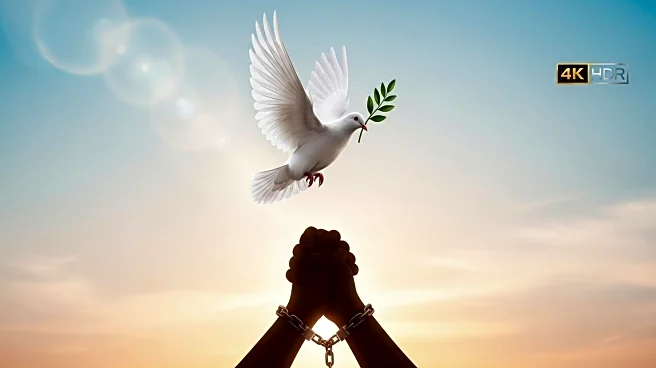What is the story about?
What's Happening?
Evyatar David, who was previously captured by Hamas and forced to dig his own grave, has been released along with other hostages in Gaza. This release comes after a historic cease-fire deal brokered by President Trump. According to reports, all 20 hostages were able to walk to Red Cross trucks under their own power. The first group of seven hostages returned to Israel early Monday morning, followed by the release of the remaining 13 hostages later in the day. This development marks a significant moment in the ongoing conflict, as the hostages were transported out of Palestinian territory by Red Cross trucks.
Why It's Important?
The release of hostages by Hamas is a critical development in the Israeli-Palestinian conflict, highlighting the impact of diplomatic interventions. The cease-fire deal brokered by President Trump underscores the role of international diplomacy in resolving such conflicts. This event may influence future negotiations and peace efforts in the region. The release of hostages is a relief for their families and could potentially ease tensions between the involved parties. It also demonstrates the effectiveness of humanitarian organizations like the Red Cross in facilitating safe passage for individuals in conflict zones.
What's Next?
Following the release of hostages, there may be increased diplomatic efforts to maintain the cease-fire and prevent further escalations. Stakeholders, including political leaders and international organizations, are likely to focus on ensuring the safety and well-being of the released hostages. There may also be discussions on long-term solutions to address the root causes of the conflict. The international community will be watching closely to see if this cease-fire leads to more comprehensive peace talks and agreements.
Beyond the Headlines
The ethical implications of hostage-taking and forced labor in conflict zones are profound, raising questions about human rights violations. This incident highlights the need for stronger international laws and enforcement mechanisms to protect civilians in war-torn areas. The role of media in documenting and bringing attention to such human rights abuses is crucial in mobilizing global responses and interventions.














